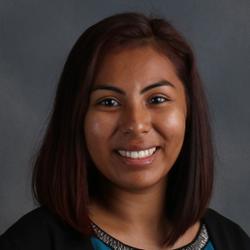From Foods & Nutrition to Preparing Diets for Insects: One Student's Journey

When Nathaly Aquino first came to Cal Poly Pomona, she enrolled as a foods and nutrition major with the goal of becoming a registered dietitian.
But it was a poster announcing a new research project that sent her off on an entirely different career track – one that has a full-time, paid internship waiting for her in Ventura County after she graduates in June.
“I am so excited because I have many friends who live around that area who work within the agriculture field,” Aquino says, “and they tell me the area is beautiful.”
Born and raised in the San Fernando Valley, Aquino was fascinated with how the human body worked even when she was in elementary school age. She wanted to know how the body digested food.
“I also recall having the program at my school where we had a vegetable of the month,” Aquino says. “In this program, we got to learn about a vegetable and the vitamins it contained, followed by easy cooking techniques. This made an impact because it was the first time I was being exposed to nutrients.”
An Interest in Research
She came to Cal Poly Pomona because she wanted a major that combined physiology and food. After her first two years at Cal Poly Pomona, Aquino sought to expand her skills and gain research experience, because she planned to pursue a graduate degree. But it was not without some trepidation.
“I was very bad at research in high school,” Aquino says.
She applied in 2014 for the McNair Scholars program, a federally funded program to help prepare low-income, first-generation and traditionally underrepresented undergraduate students for graduate and doctoral studies by providing them with research opportunities.
Much to her disappointment, Aquino didn’t get into the program. But that December, she happened to see a flyer posted seeking students to work on research involving the Asian Citrus Psyllid, an insect that spreads Huanglongbing (HLB), a disease that has decimated the Florida citrus industry and threatens California’s industry.
Finding a Niche and a Mentor
Thinking that she would have the opportunity to work with citrus fruit, Aquino contacted Anna Soper, a lecturer and the Department of Plant Sciences undergraduate research director who was heading up the project, expressing her interest.
Soper told her that the project involved working with insects and was geared more for plant science students. But Soper invited Aquino to work on a related project that focused on insect diets.
“I was happy to have her in the program, as I felt a nutrition student would bring a new perspective,” Soper says.
Aquino began working on the project, learning how to create artificial diets for insects by adding nutrients to their regular diets.
“Last year, in the Asian Citrus Psyllid project, we looked at protein fortification,” she says. “This year, we are researching the impacts of added preservatives.”
Along the way, Aquino discovered she enjoyed working in the lab under the microscope or analyzing the next diet formulation: research had become her passion, rather than something to fear. She attributes the change to Soper, who guided her through the research process.
“She instilled confidence in me. I can tell that she wants me to succeed in anything I choose to pursue,” Aquino says. “I have asked her questions regarding other fields, such as food science and biology, and she is always willing to point me toward an individual in the field.”
“She excelled at her project and was a huge asset to the program,” Soper says.
Landing an Internship
The lab experience paid off: at Ag Career Day, Soper introduced Aquino to Associates Insectary, a grower-owned cooperative that provides pest control services to citrus and avocado growers in Ventura and Santa Barbara counties. The company that seeks to control insects like the Asian Citrus Psyllid through biological means and beneficial organisms rather than through pesticides.
Associates was looking to hire an intern who could conduct research and manufacture diets for insects that have to be transported long distances, when many nutritional sources may go bad.
“When they explained to me the internship, I knew it was for me,” Aquino says. “I enjoy being in a lab, researching, analyzing and producing enhanced diets.”
Aquino accepted the 12-week internship and will start on in July. Although Aquino is not guaranteed a permanent job after the internship, Associates Insectary did ask her if she was interested in staying on longer. She said yes.
“I think that Nathaly will do very well in her future plans,” Soper says. “I am excited that she has decided to pursue research on insect diets.”
This is only the beginning of Aquino’s journey: she ultimately aspires to become a product developer for a food company.
But first she plans to get her doctorate – something that she would not have believed she was capable of were it not for her Asian Citrus Psyllid experience and Soper’s encouragement.
“Dr. Soper saw something in me that I did not,” she says. “I will always be thankful to her for believing in my abilities as a nutrition major. She helped me discover what my purpose is in life.”
